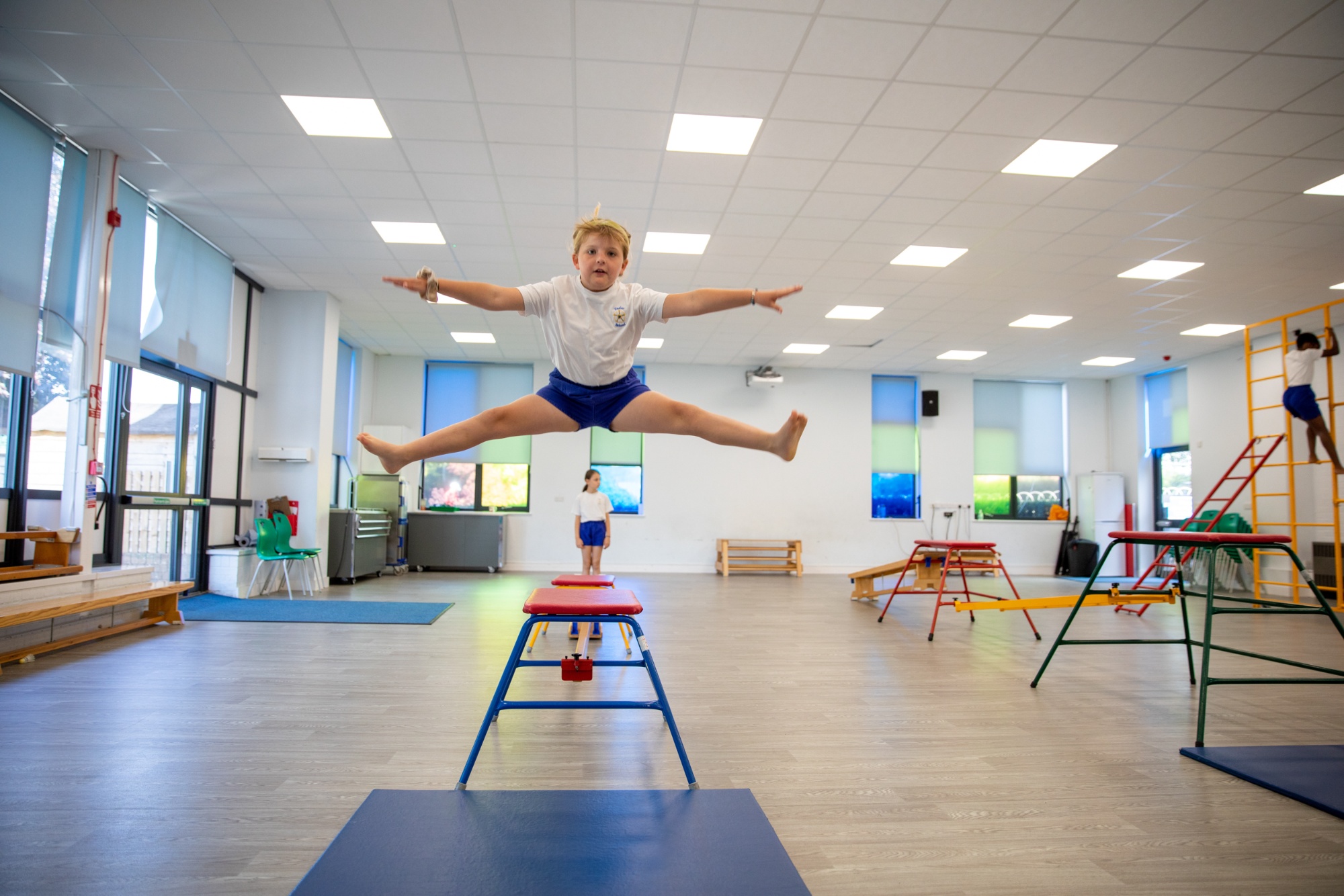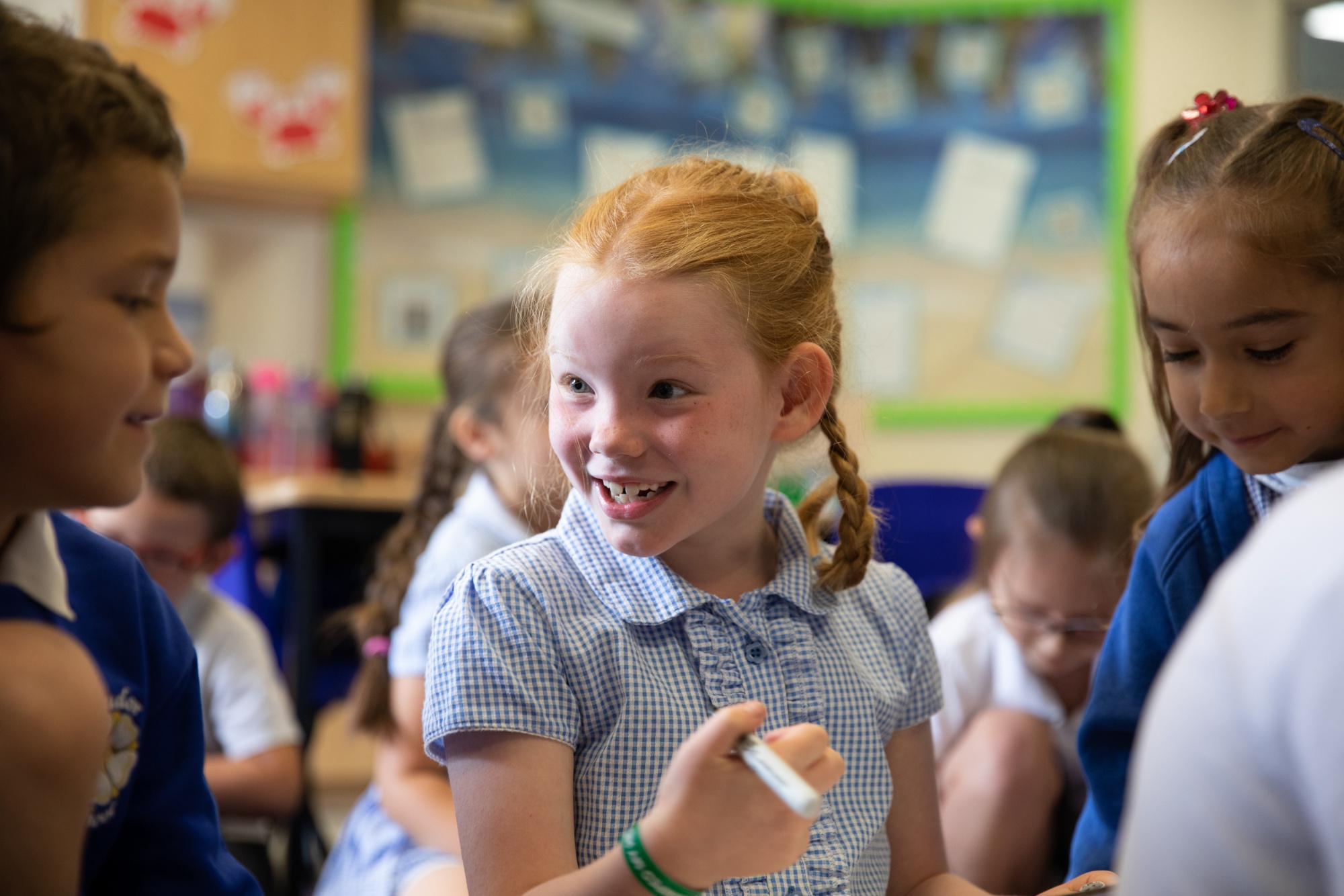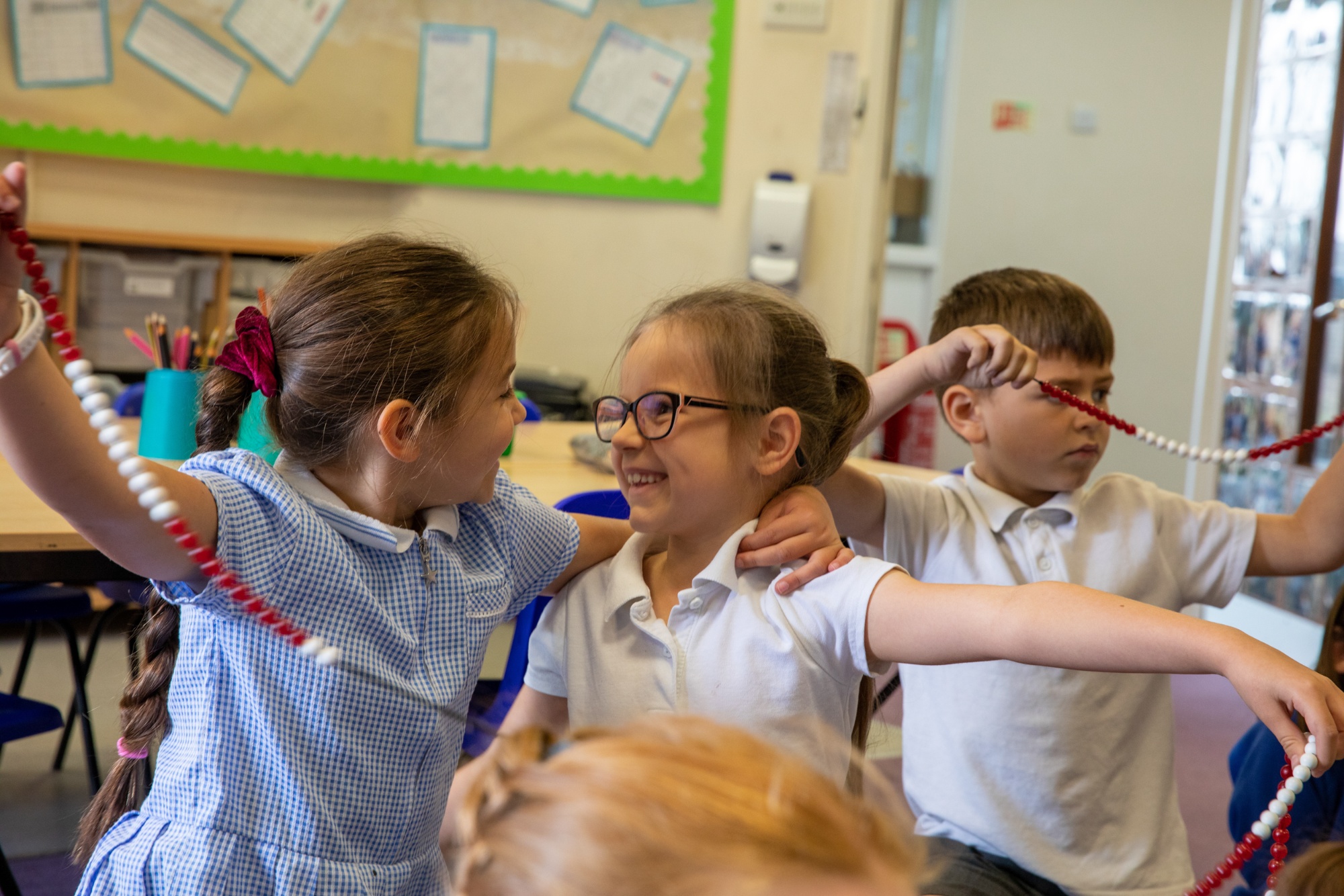|
|
|
Below is the School Information Report for Parents/Carers which explains how we provide for Children with Special Educational Needs & Disabilities at Tudor Primary School. Please click on the question that is relevant to your enquiry.
Please click HERE for the school's policy on Special Educational Needs and Disability (SEND)
School Information Report for Parents/Carers
Last updated with staff May 2025
.

Introduction
We are working to create a whole school community where everyone feels valued, accepted and able to contribute. This is based in an atmosphere of mutual respect and tolerance, supported by our positive behaviour policy and equal opportunities policies.
We believe children learn best when they feel happy, secure and confident. At Tudor, we place a strong emphasis on the right of all children to a broad and balanced curriculum, which meets their individual needs.
Fundamental to our educational philosophy is the belief that every child is entitled to full curriculum access and to an education which meets their individual needs, interests and abilities. Consequently, we aim to cater for every pupil within the general fabric of the whole school. We ensure equal opportunities in terms of access to the curriculum and carefully monitor resources, opportunities and stimuli.
This Information Report has been devised in consultation with all stakeholders, including parents and carers of pupils at Tudor Primary School.
How does our School know if children need extra help?
Children are identified as having special educational needs/disability (SEND) through a variety of ways including the following:

We know pupils need help if:
- Concerns are raised by parents/carers, teachers or the child.
- Limited progress is being made.
- Concerns are raised by the teacher, for example if your child is making poor progress despite interventions of support or there is a change in the pupil’s behaviour or self-esteem
- Use of checklists and assessments to identify areas of learning or emotional wellbeing that are in need of support.
- Consultations between class teachers and members of the leadership team where progress data is discussed e.g. pupil progress meetings.
- Liaison with external agencies e.g. Educational Psychology Service, Speech, Language, Communication and Autism Team etc.
- Health diagnosis through a paediatrician.
- Liaison with previous school or setting, if applicable.
Where a pupil’s progress is significantly slower than that of their peers, or fails to match their previous rate of progress, despite high quality teaching targeted at specific areas of difficulty, it may be that a child has SEND.
Katie Reading (School INCo) and/or your child's class teacher will arrange a meeting with you, if they believe your child may have a Special Educational Need.
What does the SEN code of Practice say?
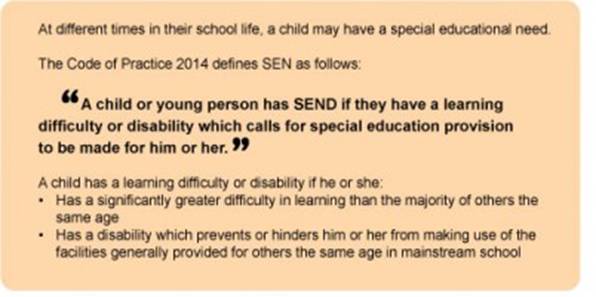
What should I do if I think my child may have special educational needs?
If you have concerns regarding your child’s progress or well-being then please speak to your child’s class teacher and/or
- Assistant Head teacher for Inclusion/INCo (Inclusion Co-ordinator) – Katie Reading
- Head teacher- Mr Weightman
- Deputy Head teacher, Maxine Smith
Contact can be made via the school office,
by telephone 01442 256294 or
by email: inco@tudor.herts.sch.uk
How will school staff support my child?
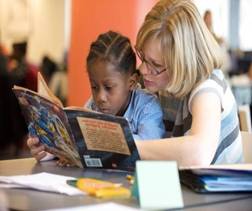 When children join the nursery or reception class, they are assessed in each area of learning. Throughout their time with us, we will continue to monitor and discuss your child’s progress with you. If a parent has a concern, this should first be discussed with the class teacher. If the class teacher has a concern, this will be discussed with the parent. The next step will be agreed together.
When children join the nursery or reception class, they are assessed in each area of learning. Throughout their time with us, we will continue to monitor and discuss your child’s progress with you. If a parent has a concern, this should first be discussed with the class teacher. If the class teacher has a concern, this will be discussed with the parent. The next step will be agreed together.
Each pupil’s education will be planned by the class teacher. It will be adjusted accordingly to suit the pupil’s individual needs. This will include:
- additional general support by the teacher or teaching assistant in class;
- work being given at the right level for your child with the right resources to help them
 If a pupil has needs related to more specific areas of their education, such as spelling, handwriting, numeracy or literacy skills etc. then the pupil will be placed in a small focus group. This will be run by the teacher or teaching assistant. The length of time of the intervention will vary according to need. It will be regularly reviewed by all involved to ascertain the effectiveness of the provision and to inform future planning. These interventions will be recorded on the class provision map. If you have any queries related to the interventions, please do not hesitate to contact the class teacher.
If a pupil has needs related to more specific areas of their education, such as spelling, handwriting, numeracy or literacy skills etc. then the pupil will be placed in a small focus group. This will be run by the teacher or teaching assistant. The length of time of the intervention will vary according to need. It will be regularly reviewed by all involved to ascertain the effectiveness of the provision and to inform future planning. These interventions will be recorded on the class provision map. If you have any queries related to the interventions, please do not hesitate to contact the class teacher.- Some children may require individual adult support for some or all of the school day.
- Some children may require specialised equipment or technology to support their learning.
- Pupil Progress Meetings are held each term. This is a meeting where the class teacher meets with the Senior Leadership Team to discuss the progress of the pupils in their class. This shared discussion may highlight any potential problems in order for further support to be planned.
- Class teachers will, in consultation with you and your child, assess your child’s needs, plan for support and ensure this is carried out. The teacher will then, with you and your child, review the progress made and if required implement further interventions. This cycle of ‘assess, plan, do and review’ will continue until the cause for concern is no longer a worry or, if necessary, it may be agreed that your child may benefit from more expert support from an outside agency such as the Educational Psychologist, Speech and Language team etc. With your consent, a referral will be made and forwarded to the most appropriate agency. After a series of assessments, a programme of support is usually provided to the school and parents/carers.
- Our governing body has a responsibility to monitor the school’s provision for children with special needs. Their nominated SEND governor regularly meets with the headteacher and/or the INCo to review the impact that our interventions are having.
How will I be involved in discussions about and planning for my child’s education?
-
All parents are actively encouraged to contribute to their child’s education. This may be through:
Written communication in the home school diary.
- Discussions with the class teacher.
- During parents evenings.
- During discussion with other professionals.
- For children with special needs, parents are strongly encouraged to be highly involved in agreeing and reviewing the targets for their children and will be invited into school at least termly to discuss their child's individual plan, alongside their child.
How will I know how my child is doing?
- Every child has a home/school communication diary. Reasons to celebrate as well as concerns, may be written in here to draw the topic to your attention. You may also use this diary to share reasons to celebrate and initially share any concerns from home if you have them.
- You will be able to discuss your child’s progress at Parent’s Evenings three times each year.
- Twice a year (mid-year and towards the end of the year) you shall receive a report outlining your child’s progress and achievement.
- Your child’s class teacher will be available at the end of each day if you wish to raise a concern. Appointments can be made to speak in more detail to the class teacher by visiting the school office.
- Katie Reading, INCo, will be available on the playground before and after school, or alternatively you can make an appointment to speak in more detail by visiting the school office or emailing her at: inco@tudor.herts.sch.uk
- Parents of children who have a ‘support plan’ will have additional meetings at least once per term to discuss progress made and set new targets, pupils will also be invited to these meetings.
How will the learning and development provision be matched to my child’s needs?
All children at Tudor, whatever their ability, are taught at a level that is both challenging and realistic for each individual child. Children with special educational needs are supported while our higher attainers are given more demanding work. Generally, this takes place within the usual working environment and children are not segregated according to needs.
However:
When concerns are raised about a pupil’s progress a four stage process: Assess, Plan, Do and Review will be adopted to give further identified support and assistance.
 Assess: the pupils needs taking in all information from parent, class teachers and assessments;
Assess: the pupils needs taking in all information from parent, class teachers and assessments;- Plan: identifies the barriers to learning and plans the learning
- Do: provide the support;
- Review: Measure the impact of the support and consider whether changes need to be made. All involved contribute-the learner (using pupil voice), parents/carers, teacher, and if necessary the INCo will decide on the next steps.
Once a child has been identified as having special needs and advice and support from other professionals has been received, their work will, if necessary, be further adjusted by the class teacher to enable the child to access the curriculum more easily.
Teaching Assistants (TAs) or Learning Support Assistants (LSA's) may be allocated to work with the pupil on a 1:1 or small focus group to target more specific needs.
If appropriate, specialist equipment may be given to the pupil e.g. writing slopes, concentration cushions or pen/pencil grips, or specialist provision may be made e.g. consideration of: their seating position, ability to copy from the board, length of time concentration is required or, pre-teaching vocabulary.
What support will there be for my child’s overall wellbeing?

Katie Reading is the Senior Mental Health Lead and Qualified First Aider at Tudor Primary and all staff receive annual Mental Health training.
We place great value on the all round development of each individual child and we recognise that we need to encourage in the children such skills as assertiveness, resilience, co-operation, tolerance and empathy. We seek to develop these qualities in our children, encouraging them to be good citizens through a variety of approaches, including:
- The student council - Tudor Owls,
- Circle time,
- PSHE and Relationships Education,
- Assemblies,
- Values based curriculum.
At Tudor, we teach 'The Zones of Regulation' programme to support pupils in understanding their emotions and to develop self-regulation strategies. Pupils also learn about the 'Five ways to wellbeing'. Evidence suggests that there are 5 steps you can take to improve your overall mental health and emotional wellbeing - these are; connect, be active, take notice, learn and give.
Our policies including teaching and learning, behaviour, anti bullying, equal opportunities, race relations, children looked after, supporting children with medical conditions and special educational needs all contribute to a climate where all children feel happy, successful and valued.
In addition, Tudor School offers a variety of additional support and methods to provide pastoral support for pupils experiencing emotional difficulties, including:
- Social skills/friendship groups to meet specific needs,
- Psychotherapy in school with independent specialists which is regularly monitored and reviewed with parents, child and staff,
- A lunchtime club, offering a quiet and calm provision,
- 1:1 Mentoring sessions with our Pastoral support worker, Emma Green,
- 'Check-in' Angels,
- 'Positivity' books,
- Individual or group support from Dacorum Education Support Centre (DESC).
For further information about how we support the emotional wellbeing of pupils at Tudor please look at the 'wellbeing' section of the website.

Pupils with medical needs are very well supported:
- Staff receive annual anaphylaxis, epilepsy, diabetes and biannual asthma training.
- Identified staff members have basic first aid training.
- Foundation stage staff have paediatric first aid training.
- Depending on an individual’s needs, appropriate training is carried. out by staff involved with that particular child.
For further information about how we support children with medical conditions, please ask for a copy of our 'Supporting Children with Medical Conditions' policy from the school office.
How does the school know that the provision is effective?
- Regular review of every child's progress at internal pupil progress meetings
- School staff carry out assessments with any child who requires intervention support, this gives us a baseline to assess the impact of the provision put in place. This enables us to know whether to continue with the intervention or to try a different approach
At Tudor we also highly value the feedback from parents and pupils of the effectiveness of what we do for their children. We gain your views in a variety of ways:
- Parent and pupil views are gathered as SEN plans are reviewed
Parent View (an online feedback form – accessed via the school website)
- Parent questionnaires
- The annual pupil questionnaire
- Return slips following the publication of your child’s report
- Termly 'SEND' pupil voice activities
The school endeavours to be self-critical and look for areas to develop for the well-being of our pupils. To do this, we evaluate every area of our practice at least annually and in many cases more frequently than this e.g pupil progress, our curriculum, lessons, intervention records, support plans, our environment, records of incidents and provision mapping.
What specialist services and expertise are available at or accessed by the school
Following consultation with parents it may be agreed that gaining the expertise of different professionals from outside of the school, may be helpful. Here are some of our partners:
- Specialist Advisory Teachers for Speech Language Communication and Autism (SLCA)
- Child Protection School Liaison Officer
 Educational Psychologist
Educational Psychologist- CAMHS (Child & Adolescent Mental Health Service), including Step 2
- AIO (Attendance Improvement Officer)
- Children's Services
- Speech and Language Therapy
- Occupational Therapy
- School Nurse
- Family Support Worker
- Family Centres
- Woodfield Special School Outreach Teachers
- DESC (Dacorum Education Support Centre)
- Physiotherapists
- Physical or Neurological Impairment Specialist Teachers
- Deaf and Hearing Support Service
- Visual impairment Team
-
On occasions, it may be helpful for parents to gain additional support directly from other professionals. This may include:
- The child’s GP.
- The educational psychology service who offer a contact line which parents may use 01992 588574 (open at specific times – please consult with the school for advice)
- Speech and Language Therapy Support Line (for more information click here) 01992 823193
- The family support worker based at Hobbs Hill Wood School 01442 41022
- SENDIASS Special Educational Needs and Disabilities Information and Advice Support Service - independent support on Special Educational Needs and Disability on 01992 555847
What training have the staff, supporting children and young people with SEND, had or are having?
Katie Reading (INCo) holds the National Award for SEN Coordination (NASENCO) Award.
Different members of staff have received training relating to SEND. These have included sessions on:
- How to support pupils on the autistic spectrum.
- How to support pupils with social and emotional needs.
- How to support pupils with speech and language difficulties.
- How to support pupils with ADHD.
- How to support pupils with dyslexia and other Specific Learning Difficulties.
- How to support children who have experienced adverse childhood experiences (ACE's).
- Mental Health Level 1 Training.
How will you help me to support my child’s learning?
- The class teacher may suggest ways of how you can support your child.
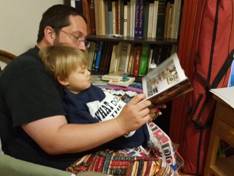 Parent training courses are advertised in our school newsletter and on the school website
Parent training courses are advertised in our school newsletter and on the school website- Teaching staff provide 'Welcome to Year _' presentations that direct you in the support you can offer through home learning in reading, writing, maths and social development.
- Parents of children joining Tudor in Reception, are invited to attend a transition meeting and 'Stay and Play' sessions at the start of the new academic year.
- Regular parent review meetings.
- If your child has a support plan, at the termly meetings with parents and carers about these plans, there is an opportunity to discuss specific ways to support your child's learning at home.
- Teachers regularly update their class section of the school website (and their blog) to share what your child will/have been learning.
How will my child be included in activities outside the classroom including school trips
- Activities and school trips are available to all.

- Risk assessments are carried out and procedures are put in place to enable all children to participate.
- However, if it is deemed that an intensive level of 1:1 support is required, a parent or carer may be asked to accompany their child during the activity.
How accessible is the school environment?
As a school, we are happy to discuss individual access requirements. Facilities we have at present include:
Ramps into school to make the buildings accessible to all.
- Three toilets adapted for users with disabilities.
- Stair lift in the main school building giving access to the hall.
- Step-ups to toilet seats in nursery and reception.
For further information, please read the accessibility policy and plan.
Who can I contact for further information?

If you wish to discuss your child’s educational needs or are unhappy about something regarding your child’s schooling, please contact the school office to arrange a meeting with the class teacher. Following this, a meeting can be arranged with the Assistant Head Teacher for Inclusion.
The Assistant Head for Inclusion is: Katie Reading
To arrange an appointment please contact the school office: 01442 256294
or email on: inco@tudor.herts.sch.uk
The schools complaints procedure can be accessed here
The schools complaints policy can be accessed here
For further support you can also contact an impartial Special Educational Needs and Disability Information and Advice Support Service (SENDIASS) here.
How will the school prepare and support my child to join the school, transfer to a new school or the next stage of education and life?
Many strategies are in place to enable the pupil’s transition to be as smooth as possible. These include:
- Discussions between the previous or receiving schools prior to the pupil joining/leaving.
- Children attend a transition session in July where they spend time with their new class teacher.

- Additional visits and/or meetings are also arranged for pupils who need extra time in their new school.
- Transition support groups with Emma Green, our pastoral support worker.
- Secondary school staff visit pupils prior to them joining their new school.
- Our school INCo liaises with the INCo from the secondary schools to pass on information regarding SEND pupils.
- Where a pupil may have more specialised needs, a separate meeting may be arranged with the school INCo, the secondary school INCo, the parents/carers and where appropriate the pupil.
How are the school’s resources allocated and matched to children’s special educational needs?
The SEND budget is allocated each financial year. The money is used to provide additional support or resources dependant on an individual’s needs.
How is the decision made about how much support my child will receive?
 These decisions are made in consultation with the parents, child, the class teacher and Senior Leadership Team.
These decisions are made in consultation with the parents, child, the class teacher and Senior Leadership Team.
Decisions are based upon termly tracking of pupil progress and as a result of assessments by outside agencies.
During their school life, if further concerns are identified due to the pupil’s lack of progress or well-being, then other interventions will be arranged. Some children may need short term intervention or longer learning support.
Support may be enhanced through:
- HNF or LNF (Higher Needs Funding or Local Needs Funding) which can provide resources, specialist equipment and/or teaching assistant support.
- Some children with SEN may receive Pupil Premium Grant (PPG).
- Some children may have a Team around the Family (TAF) or Families First plan to support them.
- Some children may have outcomes as part of an Education Health and Care Plan (EHCP).
How does the school contribute to Hertfordshire’s Local Offer of services and provision for children and young people with special educational needs and disability?
 The school INCo attends termly cluster meetings for SENCos where information is shared and some training is given.
The school INCo attends termly cluster meetings for SENCos where information is shared and some training is given.
The Headteacher is on the management committee of the local behaviour support centre (DESC).
The school office returns data about children with SEN to the local authority through the annual school census, which informs the authority and enables local strategic planning of SEN Support and produce information for the National SEN report.
The school receives and shares information provided by Dacorum Special Provision Locally panel and the Dacorum Extended Schools unit including the Family Support Workers.
How can I find information about the local authority’s Local Offer of services and provision for children and young people with special educational needs and disability?
Please click here to view the Local Authority’s High Quality SEND Statement.




